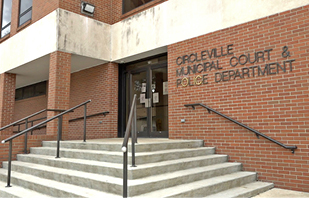Supreme Court Awards Grants to 42 Local Courts for Technology Projects

Circleville Municipal Court is one of 40 courts to receive a Supreme Court technology grant this year.

Circleville Municipal Court is one of 40 courts to receive a Supreme Court technology grant this year.
This year is one that Circleville Municipal Judge Elisa Peters will never forget.
“On Jan. 1, I received a phone call from our IT person that the court had been the target of a ransomware attack,” said Judge Peters, a Circleville native who has been on the court’s bench for 25 years as a judge and former magistrate.
The cyberattack set the court back for weeks. The judge and her staff had to write and file everything by pen and paper until the court could replace its servers and computers. The breach also strained the court’s budget, leaving it with limited funds to upgrade an already outdated system.
The Circleville Municipal Court received a $150,000 technology grant from the Supreme Court of Ohio.
“It’s a tremendous relief for us to achieve our goal of providing the best access to information for our users in the fastest and easiest way possible,” said Judge Peters. “In addition, the upgraded system has more security features to help avoid potential compromise.”
The grant is one of 42 projects funded this year to modernize court operations through the Supreme Court Technology Grant program. Local courts have received more than $43 million since the program began in 2015.
The Circleville court’s grant will cover a new case management system that will be operational later this year. The court’s first system upgrade in 17 years will make information and documents readily available and will modernize services including e-filing.
“Our clerks will be able to scan documents at the point of receipt so attorneys, the public, and law enforcement can access easily, saving people time and a trip to the courthouse,” said Judge Peters.
The upgrade will also include text and email notifications for parties and attorneys about upcoming hearings. Current notifications are by U.S. mail, and Judge Peters believes texts will improve appearance rates. When people attend their hearings as scheduled it can improve case management time by eliminating resources spent rescheduling cases and issuing warrants.
The new notification system is part of a larger goal for the court to become paperless by 2026 to increase efficiency for Judge Peters and her staff.
“I see how our court can affect people when there are obstacles for them to resolve their issues. Online records help with that while increasing access and confidence in our justice system,” said Judge Peters.


